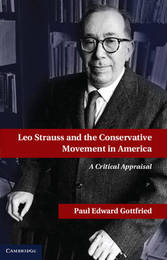
|
Leo Strauss and the Conservative Movement in America
Hardback
Main Details
| Title |
Leo Strauss and the Conservative Movement in America
|
| Authors and Contributors |
By (author) Paul E. Gottfried
|
| Physical Properties |
| Format:Hardback | | Pages:194 | | Dimensions(mm): Height 218,Width 145 |
|
| Category/Genre | Social and political philosophy |
|---|
| ISBN/Barcode |
9781107017245
|
| Classifications | Dewey:320.092 |
|---|
| Audience | | Professional & Vocational | |
|---|
|
Publishing Details |
| Publisher |
Cambridge University Press
|
| Imprint |
Cambridge University Press
|
| Publication Date |
29 December 2011 |
| Publication Country |
United Kingdom
|
Description
This book offers an original interpretation of the achievement of Leo Strauss, stressing how his ideas and followers reshaped the American conservative movement. The conservative movement that reached out to Strauss and his legacy was extremely fluid and lacked a self-confident leadership. Conservative activists and journalists felt a desperate need for academic acceptability, which they thought Strauss and his disciples would furnish. They also became deeply concerned with the problem of 'value relativism', which self-described conservatives thought Strauss had effectively addressed. But until recently, neither Strauss nor his disciples have considered themselves to be 'conservatives'. Contrary to another misconception, Straussians have never wished to convert Americans to ancient political ideals and practices, except in a very selective rhetorical fashion. Strauss and his disciples have been avid champions of American modernity, and 'timeless' values as interpreted by Strauss and his followers often look starkly contemporary.
Author Biography
Paul Gottfried is Horace Raffensperger Professor of Humanities at Elizabethtown College. He is the author of numerous books, including Conservatism in America: Making Sense of the American Right, The Strange Death of Marxism: The European Left in the New Millennium and After Liberalism.
Reviews'Paul Gottfried's book shows evidence of a lifetime of more intimate engagement with Straussians. He is respectful of the master, formed in 'a richer cultural world than his followers - indeed a Teutonic one that most of his prominent students detested'. Gottfried is clearly disappointed in Strauss's 'epigones', who are happy to refute their poorly informed but respectable critics on the Left but who refuse to engage in serious debate with their learned and perceptive critics on the Right.' Mark Shiffman, Modern Age 'I've always wanted to read a critique of Strauss - and more particularly, of Straussianism - which didn't devolve into leftist hyperbole or paranoia. This is the first I've read. Gottfried's critique is really from the right - against Strauss's postmodern reading of texts ... against the abolition of history as well as historicism, against the reclusiveness and defensiveness of the Straussian enclave, and against their fixation with Western weakness in which the world is forever 1938. He persuaded me that the core of Straussianism is political, not philosophical - and a true competitor to what I would call conservatism, properly understood. None of this takes away from the truly remarkable scholarship that Strauss and Straussians have given us, or their useful antidote to the idea that all our core debates about the world have been resolved. But it helps reveal the deeply un-conservative and profoundly radical nature of neoconservatism, and its mania for imperialism and Israel.' Andrew Sullivan, The Daily Dish '[The only book that] specifically offers a right-wing critique of this German-Jewish emigre professor who is so often assumed to be a right-winger himself ... Paul Gottfried's book... is sufficiently magnanimous that it may lead readers to a new appreciation for Strauss.' Daniel McCarthy, The University Bookman
|